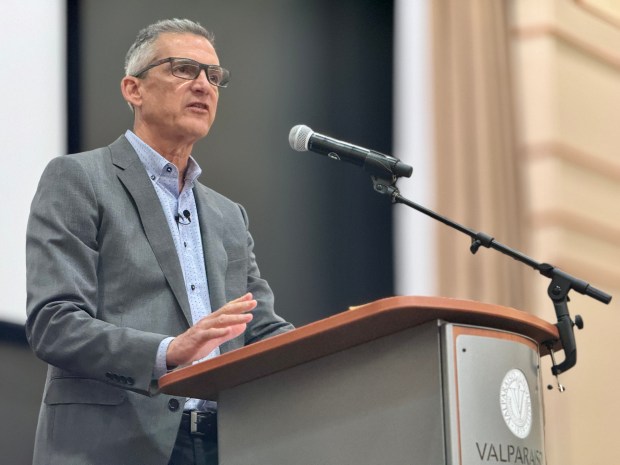Some seniors in Lincolnwood are sounding off about sidewalks – or lack of – in the north suburb, using scheduled in-person community survey encounters with village leaders and contractors to make their frustrations known.
“This village is sidewalk-challenged,” Howard Gillman, president of the Congregation Yehuda Moshe, told a planner at a community townhall held Nov. 13 at Village Hall.
He explained two condominium buildings on Touhy Avenue are home to elderly residents who rely on walkers, wheelchairs and other mobility aids, and they don’t have sidewalks near their buildings. Instead, they use the valet lane for neighboring restaurants, for example.
“We have 80- and 90-year-old people with walkers who have to walk through the valet lane at restaurants, and I just can’t believe people thought that was OK,” Gillman lamented.
Gillman spoke directly to Stephanie Nappa, a senior planner at Epstein Architecture. She was on hand that Wednesday for the two community townhalls – one during the day and the other in the evening – where residents could suggest areas in need of capital improvements.
The village of Lincolnwood is conducting a community survey to gauge the condition of sidewalks, curb cuts, crosswalks and other public pedestrian accommodations. Officials say the survey will be used to prioritize repairs on village-owned pathways and keep up with Americans with Disabilities Act compliance.
Nappa said Gillman was the third person that day to mention the issue of seniors and sidewalk access.
In response to Gillman’s concerns, she explained that Touhy Avenue is a state road – under the purview of the Illinois Department of Transportation – and the land in question is private, limiting how the village of Lincolnwood could address the issue. She said in her experience sometimes villages can ask business owners to pay for sidewalks for pedestrians.
“I have seen it in other locations where there’s enough demand and need where the village can go to the owner and say ‘hey there’s a lot of demand and need,’” she said.
However, she added, municipalities usually pass transportation complaints on to the respective authority that can address it.
“Any information we get on state-owned facilities or county-owned facilities, we can pass along to those folks,” she said, referring in this case to IDOT and Cook County.
Nappa said buildings constructed during certain time periods weren’t required to have sidewalks so they were never built. Additionally, some other sidewalks can be too narrow and well out of ADA compliance.
“As I was driving around today, I noticed the carriage walks which are maybe 3 feet wide, and definitely not up to today’s standards of accessibility,” Nappa said.
But even sidewalks the village owns may take years or decades to get repaired. Officials explain that the purpose of the study is not to suggest the town will get more walkable overnight, but is expected to help prioritize high-need areas and to note which pathways are out of compliance.
The study is part of an ADA transition plan, which municipalities need to get some financial aid.
“Essentially, every public jurisdiction is required to have an ADA transition plan in order to be eligible for certain federal funding,” Nappa said.
The transition plan itself is funded through the Chicago Metropolitan Agency for Planning, which gets federal dollars to help towns create the transition plans.
Nappa said the village will host another townhall in a few months, and residents may contact the village to email or call in their suggestions.
Jesse Wright is a freelancer.



